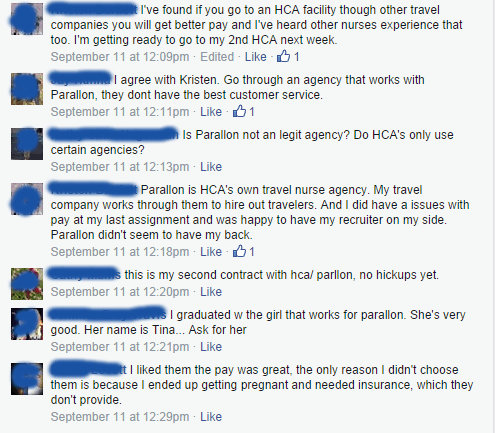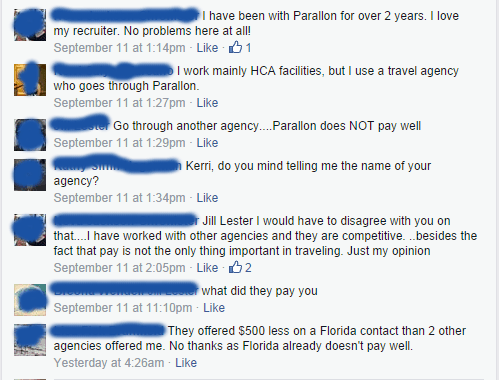7 Things to Know about Travel Nursing in Florida
It’s possible that Florida utilizes more travel nurses, travel healthcare professionals, and temporary healthcare professionals than any other state in the nation. The high volume of travel nursing jobs in Florida is driven largely by the state’s seasonal population fluxes. As you may be aware, Florida experiences annual population spikes as “snow birds” migrate south from the colder northern states between October and May.
The migration peaks in the winter months between December and March. Florida then experiences a population reduction as snow birds return to the northern states for the summer months. These annual population fluxes create a unique set of circumstances. Understanding the factors at play will help travel nurses interested in working in Florida formulate a strategy.
At a quick glance, it would appear as though the state of Florida is home to more travel healthcare staffing agencies than any other state in the nation. I haven’t conducted a thorough survey, but I expect this is the case. And it would make sense. The snow bird migration certainly predates the nursing shortage that is widely credited for the recent rise of travel nursing nationwide.
So it stands to reason that Florida has had a need for temporary healthcare professionals for far longer than the rest of the nation. This need could have given rise to a vibrant healthcare staffing industry. Some agencies in Florida specialize only in the Florida market, some specialize in the east coast, and there are some industry powerhouses based in Florida that provide robust services nationwide.
Seasonal Travel Nursing Jobs in Florida
While this seasonal flux may have given rise to many travel nursing agencies in Florida, it also led many hospitals and healthcare systems to innovate their own methods for addressing their seasonal staffing needs. This is why Florida is a hot bed for Seasonal Nursing Contracts. This is an important option to consider if you’re interested in travel jobs in Florida.
Advantages of Seasonal Contracts
Seasonal Contract are a unique type of travel healthcare job. In this scenario, the healthcare professional signs on directly with the hospital. There is no agency involved. There are advantages and disadvantages to this arrangement.
One advantage is that it may be easier to solve certain problems or avoid them altogether when you’re working directly with the hospital. This is particularly true for problems involving pay and compliance documentation. Many problems with these two variables are the result of miscommunication between hospitals and agencies, so they’re easily avoided when the middle-man is cut out. And when such problems do arise, it’s always easier to resolve them when you can go straight to the source.
Another potential advantage of seasonal contract is that the pay is typically higher. By cutting out the middle-man, hospitals are typically able to offer a little more money. And because these hospitals have been engaged in this activity for so long and utilize so many travel nurses, they tend to get good deals on housing accommodations compared to agencies that infrequently staff in the Florida market.
To give you an idea of the pay rates offered by Seasonal Contracts, I’ve seen compensation packages offering over $43 per hour plus a $2000 completion bonus for completing 6 months of working 7 shifts every 2 weeks. Breaking the $2000 completion bonus down to an hourly figure for comparison purposes yields $1.84 per hour. So you’re looking at a blended rate of nearly $45 per hour. This particular deal did not include housing or medical benefits. My experience indicates that this compensation package is about $3-$5 per hour higher than a comparable deal that you might get from an agency.
However, please bear in mind that the difference in compensation between Seasonal Contracts and Travel Contracts (utilizing an agency) varies. Depending on the bill rate that an agency has secured with the hospitals the agency is contracted with, the differences in compensation can be as little as $1-$2 per hour to as high as $10 per hour or more.
Moreover, travel nursing pay packages almost always include some level of tax-free money. Of course, tax-free compensation results in higher net pay. Therefore, there may be little difference between the net pay earned for working a seasonal contract and the net pay earned for a travel contract despite the higher gross pay offered by the seasonal contract.
Disadvantages of Seasonal Contracts
Despite the higher pay, there are some disadvantages to Seasonal Nursing Contracts. First, they’re harder to land than standard travel contracts. The hospitals receive a high volume of applicants and they can be very selective. Moreover, hospitals tend to under-staff their Seasonal Contract needs because they never want to over-staff and they know they can count on agencies to help them fill any leftover needs.
Second, Seasonal Contracts tend to be less flexible. Hospitals tend to have firm requirements on start dates especially if you’re a new candidate. This means that there are windows of opportunity for applying for Seasonal Contracts. If you miss the window, then you may need to wait until the following year. Seasonal Contracts can also have strict scheduling requirements. Missing shifts can jeopardize any bonuses being offered. Seasonal Contracts may also require that you float between hospitals in the same healthcare system in order to get your shifts. You should inquire about all of these issues during the interview process if they are important to you.
If you are interested in Seasonal Contract jobs, you should inquire directly with the hospital or healthcare organization operating the hospital in question. If you’re targeting a particular region or city in the state of Florida, then use the American Hospital Directory to find potential hospitals to target and visit their websites. Three popular options are NCH Healthcare System in Naples, Florida, Lee Memorial Health System in Fort Myers, Florida, and Baycare in the Tampa Bay region.
Float Pool Travel Nursing Contracts in Florida
As mentioned briefly above, in addition to Seasonal Contracts, the Florida travel job market also has a high number of float pool contracts. Just like Texas, Florida float pool contracts require that you be willing to go to different hospitals within the region in question in order to pick up your guaranteed shifts. These contracts can sometimes be obtained directly with the hospital, but they most often go through an agency that helps the hospital manage scheduling for the travel nurse.
Again, when it comes to float pool contracts, there are several issues you should determine before accepting an assignment. First, you should determine the distance between the housing being provided and the hospitals at which you maybe working. Second, get an idea of commute times in the area. Third, determine the on-call and call-off rules to determine what type of notice is required before schedule changes. Finally, determine the rules regarding mid-shift floating. Mid-shift floating occurs when the hospital requests that the travel nurse finish the remainder of the shift at another hospital. Most places do not do this, but it does happen.
Travel Nursing Jobs in Florida
Travel Nursing Pay Rates in Florida
In addition to Seasonal Contracts and float pool contracts, Florida also has plenty of standard travel jobs. There are several factors to consider when it comes to assignments in Florida. First, my experience indicates that rates are fairly stable throughout the state. While there are certainly variations in pay rates, these variations tend to be much less pronounced than they are in California and Texas. This means that you’ll almost always get more bang for your buck in areas with the lowest cost of living.
Travel Nurse Housing in Florida
Second, securing your own housing in most parts of Florida is much easier than it is in other states. Because of its popularity as a short-term destination for both general tourists and the snow birds, Florida is flush with furnished condos, homes, and apartments that accept short-term leases.
This is perfect for travel nurse housing. There are many websites devoted to Florida’s short-term and vacation housing options. Travel nurses can also use Craigslist.org and some of the other housing options discussed here.
The Cyclical Nature of Jobs
Third, jobs in Florida tend to follow the snow birds. Travel nurses can expect to see an influx of jobs in Florida with start dates in October, December, and March. My experience indicates that December is the month with the most job starts in Florida. Hospitals know this well in advance, so they release these job openings very early. This is great because it gives travel nurses a head start they typically don’t receive in other locations.
HCA in Florida
Fourth, HCA is has a major footprint in the state of Florida and they utilize travel nurses a lot. I counted 39 HCA hospitals in the state of Florida and that didn’t count the multitude of Surgery Centers that they operate in the state. HCA hospitals have mixed reviews from travel nurses. Ultimately, whether or not an HCA hospital is good for travelers depends largely on the hospital, unit, and management.
Another issue to consider is that the HCA owned and operated staffing agency Parallon is essentially the Managed Service Provider for all HCA hospitals. This means that Parallon has an exclusive staffing contract with HCA, but utilizes “sub-vendors” (other staffing agencies) to help them fill all of HCA’s supplemental staffing needs.
This means that Parallon should have first crack at filling HCA travel assignments. Moreover some argue that Parallon is able to pay more because sub-vendors are charged a fee by Parallon which reduces the bill rate for the sub-vendor agency. However, there are mixed reports on these and other issues as illustrated in images below from a travel nursing forum. Moreover, Parallon is ranked fairly low by both Travel Nursing Central and Highway Hypodermics.
Like all travel job markets, there is a lot of competition among agencies within the Florida job market. As a result, you’ll never really know who is going to have access to the best jobs, the highest paying travel nursing jobs, or the jobs you’re specifically seeking. Controlling your own submission profile can help you navigate the system more effectively and efficiently. You can utilize BluePipes to accomplish this goal and get more out of your travel nursing career.








Please do show
YOU can be your own travel nurse agency! Learn how to negotiate!
How
Good overview but you neglected to give a few warnings. 1). Housing may be available BUT very expensive during season. 2). Difficult to find housing if you travel with pets. 3) watch the seasonal agreements you go in to sign.. The shfts/date/time commitment may not be what was agreed to in a phone offer. Example: agreed to a 7a-7p 3-days a week job and the contract for me to sign was 9a-7p 4 days/week. The only proof I had was my notes from the offer. I refused to sign and a corrected contract was written. The same “stunt” was tried on another nurse and she refused also and was given her agreed upon shift, another was told there were no day shifts and nights was all they had. She agreed to nights and regretted it the whole season. The hospitals “forget” to put anything in writing and tell you to just come in and sign when you arrive. Slick they are… Travel companies make sure everything is signed before you leave so no surprises. Seasonal agreements are easier to leave, you just resign with proper notice because it is not a binding contract.